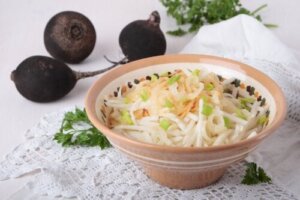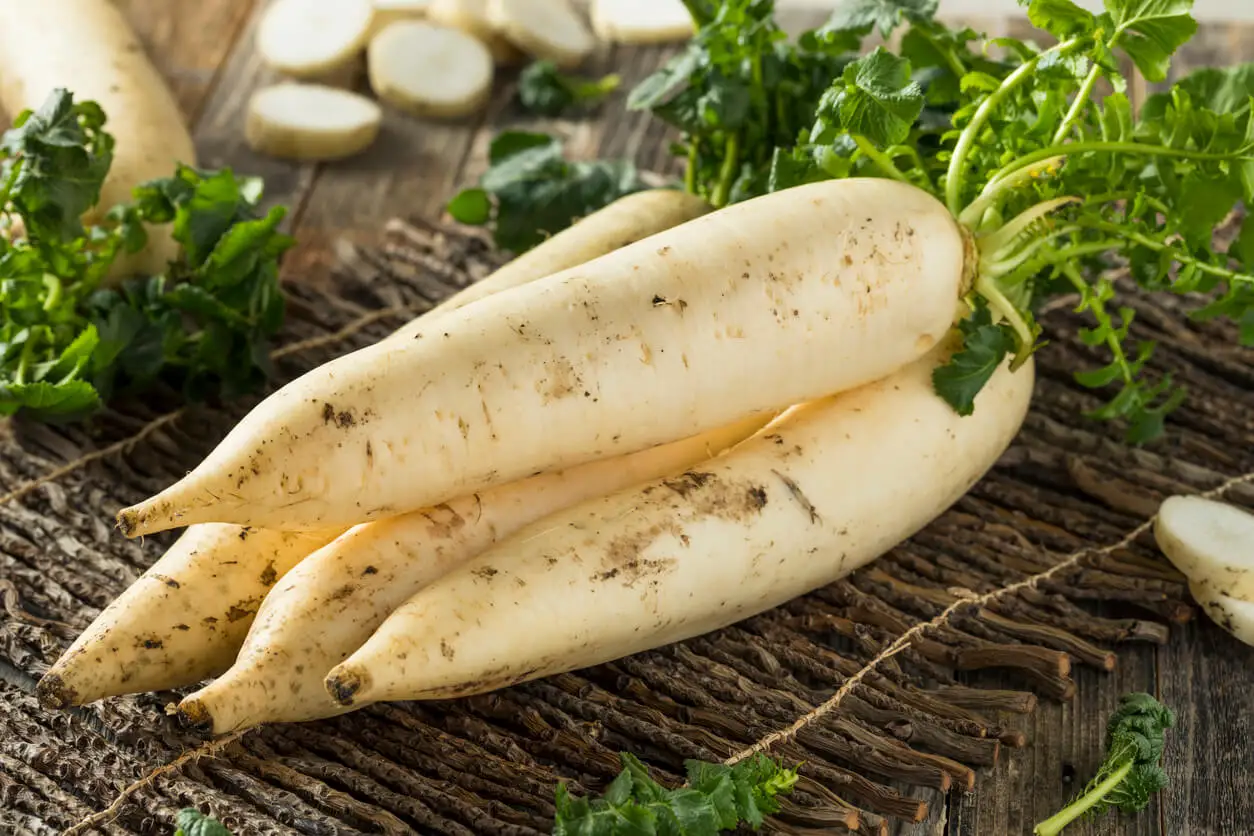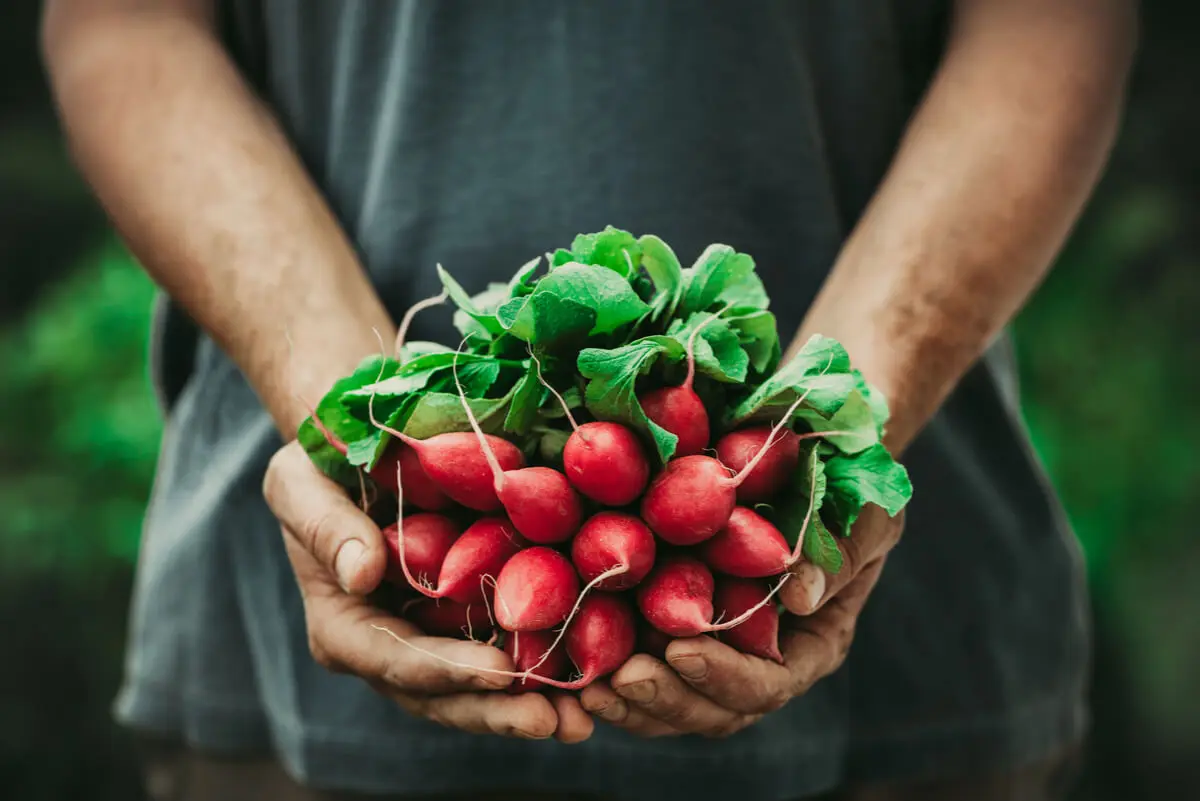Black Radish: Nutrients, Uses and Potential Benefits


Written and verified by the nutritionist Saúl Sánchez Arias
The black radish can have several health benefits. It’s especially beneficial for relieving gallstones and improving the function of the digestive system. In addition, it has a lot of antioxidants, so it could help prevent the development of several chronic and complex pathologies. It’s easy to introduce into the diet. We’ll tell you everything you need to know about it.
Before we start, we must emphasize the need to include vegetables frequently in the diet. These foods contain large amounts of vitamins and minerals, as well as important phytochemicals. These keep internal inflammation and oxidation, allowing the body to function optimally over the years.
The black radish and digestive system
The consumption of black radish is especially indicated to improve the functioning of the digestive tract. Ideally, to achieve good results, you should include it in your diet at least twice a week.
It could even be used in an adjuvant way in the treatment of infectious pathologies of respiratory type, also helping to clear the throat and reduce pain. In fact, it’s considered a good antimicrobial and anti-inflammatory.

According to a study published in the journal Food Science & Nutrition, the inclusion of black radish in the diet is effective in improving the treatment of non-alcoholic fatty liver disease.
It’s true that the test was carried out on animals and isn’t 100% comparable to humans, but the indications are positive. The anti-inflammatory and antioxidant effects allow the organs to function optimally, which contributes to the resolution of problems within the body.
There’s also further evidence that black radish extract is positive in safeguarding liver health, especially by limiting oxidative stress. In this sense, it has a similar effect to artichoke extract, another of the most commonly used products to protect liver tissue.
Find out more: Radish Leaves: The Benefits and Ways to Use Them
Black radish against gallstones
In traditional Mexican medicine, black radish is used to purify gallstones. There’s some research in animals and in experimental models that affirm that this food could be effective in improving the functioning of the gall bladder, thus avoiding the genesis of stones that cause pain.
However, it should be noted that, in the most serious cases, it’s advisable to go to the doctor from them to prescribe a pharmacological treatment, if necessary. When this type of problem develops, the digestive process can be put at risk, with changes in the subsequent absorption of fats. It’s best to consult a professional for them to propose an efficient solution to prevent discomfort or further complications.

You may also be interested in: Can You Fight Gallstones Naturally?
How to consume black radish
Black radish is usually larger than conventional radish. It has a spicy flavor and a strong smell. It’s harvested between May and July. In European cuisine, it isn’t very common, but it can be used as a garnish with a potato omelet. It’s also possible to boil it and eat it on its own, although a better flavor is usually achieved if it’s added to soups or stews.
Another option is to prepare salads and add black radish to improve its flavor. It even works very well in sandwiches and as an accompaniment to pickles. Although it can be found in different formats, it’s best to consume it in its natural form.
It’s also possible to grind it and drink it with water on an empty stomach, although this method doesn’t provide any particular benefits above being included in the more traditional diet.
Nutritionally, it’s a very beneficial product, as it contains vitamins such as vitamin A, B group vitamins and certain minerals. Among the latter, we can highlight potassium, iodine, copper, and calcium.
Potassium, in particular, has been shown to have a positive effect on blood pressure modulation. It’s antagonistic to sodium in this regard, so it’s vital for it to appear in your diet in sufficient quantities.
Black radish: a healthy addition to your diet
Black radish is a food that has several positive properties for health, so it can be included in the diet on a regular basis. It’s a source of vitamins and phytochemicals that will help to keep the inflammatory and oxidative mechanisms that take place internally under control. Thus, the incidence of many chronic and complex pathologies that compromise the state of health is reduced.
Bear in mind that many fruits and vegetables have benefits for the functioning of the human body. It’s really important to ensure that these, as well as other healthy products, are included in our diets to make them as varied as possible. The aim is to avoid nutritional deficits and satisfy energy needs to achieve internal homeostasis.
All cited sources were thoroughly reviewed by our team to ensure their quality, reliability, currency, and validity. The bibliography of this article was considered reliable and of academic or scientific accuracy.
- Ahn, M., Kim, J., Choi, Y., Ekanayake, P., Chun, J. Y., Yang, D., Kim, G. O., & Shin, T. (2019). Fermented black radish (Raphanus sativus L. var. niger) attenuates methionine and choline deficient diet-induced nonalcoholic fatty liver disease in mice. Food science & nutrition, 7(10), 3327–3337. https://doi.org/10.1002/fsn3.1200
- Ahn, M., Kim, J., Hong, S., Kim, J., Ko, H., Lee, N. H., Kim, G. O., & Shin, T. (2018). Black Radish (Raphanus sativus L. var. niger) Extract Mediates Its Hepatoprotective Effect on Carbon Tetrachloride-Induced Hepatic Injury by Attenuating Oxidative Stress. Journal of medicinal food, 21(9), 866–875. https://doi.org/10.1089/jmf.2017.4102
- Filippini, T., Naska, A., Kasdagli, M. I., Torres, D., Lopes, C., Carvalho, C., Moreira, P., Malavolti, M., Orsini, N., Whelton, P. K., & Vinceti, M. (2020). Potassium Intake and Blood Pressure: A Dose-Response Meta-Analysis of Randomized Controlled Trials. Journal of the American Heart Association, 9(12), e015719. https://doi.org/10.1161/JAHA.119.015719
This text is provided for informational purposes only and does not replace consultation with a professional. If in doubt, consult your specialist.








